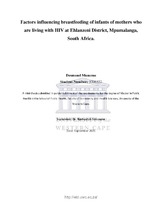| dc.contributor.advisor | Solomons, Nasheetah | |
| dc.contributor.author | Munemo, Desmond | |
| dc.date.accessioned | 2022-02-22T11:00:11Z | |
| dc.date.available | 2022-02-22T11:00:11Z | |
| dc.date.issued | 2021 | |
| dc.identifier.uri | http://hdl.handle.net/11394/8725 | |
| dc.description | Master of Public Health - MPH | en_US |
| dc.description.abstract | The World Health Organisation recommendations for breastfeeding in the general population, including mothers living with HIV, emphasise breastfeeding within one hour of birth, exclusive breastfeeding (EBF) during the first six months of life, and continued breastfeeding for up to two years or beyond. However, only 34.8% of infants worldwide are exclusively breastfed for the first six months of life, and as a result, about 1.4 million infants lose their lives due to undernutrition. In South Africa, only 31.6% of infants are exclusively breastfed for the first six months. Despite the benefits of exclusive breastfeeding, many mothers living with HIV do not initiate breastfeeding or discontinue breastfeeding prematurely. It is, therefore, crucial to determine the barriers inhibiting the uptake of EBF and factors promoting mothers living with HIV to adopt exclusive breastfeeding. | en_US |
| dc.language.iso | en | en_US |
| dc.publisher | University of Western Cape | en_US |
| dc.subject | Exclusive breastfeeding | en_US |
| dc.subject | Infant formula | en_US |
| dc.subject | Maternal-infant bonding | en_US |
| dc.subject | Mothers living with HIV | en_US |
| dc.subject | Mpumalanga province | en_US |
| dc.subject | World Health Organisation (WHO) | en_US |
| dc.title | Factors influencing breastfeeding of infants of mothers who are living with HIV at Ehlanzeni District, Mpumalanga, South Africa | en_US |
| dc.rights.holder | University of Western Cape | en_US |

